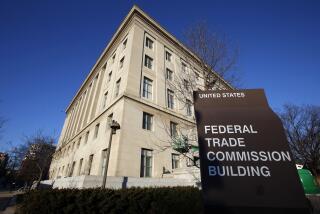Regulators Planning to Restrict Dual Trading
WASHINGTON — The federal agency that regulates the nation’s futures exchanges said Friday that it will ask those exchanges to restrict the controversial practice of dual trading.
The Commodity Futures Trading Commission also released its long-awaited study of dual trading, which involves traders who execute trades for themselves and their customers on the same day.
The study found that dual traders are not “a critical ingredient in providing liquidity and low-cost trade execution.”
Critics of dual trading, which is not illegal, claim that it poses conflict-of-interest problems for traders who might try to make a profit trading for themselves ahead of their customers.
This practice, known as front-running, is banned.
Front-running is among the many fraud schemes alleged in the indictments of more than 40 traders at the nation’s two-largest futures exchanges in Chicago this past summer.
Based on the study, as well as on the Chicago indictments, the CFTC said its staff was preparing “proposed rules that would require exchanges to restrict dual trading on a provisional, phased-in basis.”
CFTC Chief Economist Steven Manaster said, however, that developing those rules “will be a lengthy process.”
Legislation that would severely limit dual trading is pending before Congress.
“Dual trading exists in all markets,” the Chicago Mercantile Exchange said in a prepared statement, adding that the exchange “after its own study, has proposed to deal with any real or perceived problems with dual trading through the enhancement of the audit trail. Both the House and Senate have also adopted this approach.”
An audit trail is an anti-fraud device to reconstruct a trade to determine when it occurred and who was involved.
“We will review the CFTC’s report on dual trading and make comments to any proposed rules at the appropriate time,” the CME statement concluded.
Futures contracts are agreements to deliver a quantity of goods at a specified price at a certain time in the future. Futures contracts are used by producers of such commodities as soybeans or gold to lock in a favorable price down the road.
And speculators, in turn, buy and sell those contracts to profit from constantly changing price differences.
Supporters of dual trading claim it helps keep trading costs down and keeps the markets liquid when there is little trading, especially in small, low-volume markets.
“It had been argued that dual traders might be superior providers of liquidity or that dual traders might be superior in terms providing customer service and on that basis were kind of super traders--they were absolutely essential to whatever was going on in these markets,” Manaster said.
But he noted that the 47-page study, conducted by the CFTC’s Division of Economic Analysis, found that the “vast majority” of dual traders tend to specialize in trading either for themselves or for their customers. Dual trading is really a sideline for most floor traders, constituting only about 10% or less of their business.
The study also found that:
- There is no statistical support for claims that dual trading increases in low-volume months;
- Dual traders “do not, on average” get better quality trades for their customers than brokers who trade only for customers.
- Dual traders do not help make the market any more liquid than “exclusive traders,” or those who don’t engage in dual trading.
More to Read
Sign up for Essential California
The most important California stories and recommendations in your inbox every morning.
You may occasionally receive promotional content from the Los Angeles Times.










